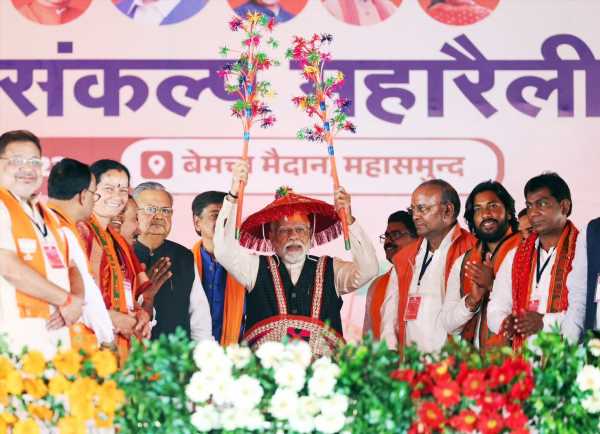How Will Assembly Polls Impact Markets?
‘The outcome of the state polls may lead to some strategy-related permutations and combinations and the markets may extrapolate it to the likely outcome in the general elections.’
The assembly elections across five states — Chhattisgarh, Madhya Pradesh, Rajasthan, Telangana and Mizoram — that begin on November 7 and are a lead-in to the general elections scheduled for May 2024 may not be much of a bother for the markets, at least for now, believe analysts.
This, they believe, is because the electorate votes differently in the state and general elections.
On their part, the markets, they said, are only looking for a stable regime and policy continuity over the long term.
‘We would closely track the results for signs of read-across to the general elections. The pushback from some investors is that state elections should be viewed separately from the general elections,’ wrote analysts at Morgan Stanley in a recent coauthored note lead by Chetan Ahya, their chief Asia economist.
‘But from our perspective, either the state election results or moves from the Opposition alliance that makes it seem that that the Opposition alliance is gaining in momentum would nonetheless raise market’s concerns over political and policy continuity,’ the note added.
Political pundits, meanwhile, see these elections as the semi-finals to the upcoming Lok Sabha elections that is likely to provide a glimpse into how the India’s Hindi-speaking heartland — a stronghold of the Bharatiya Janata Party (the BJP won 79 per cent or 177 out of total 225 seats in 10 Hindi speaking states in 2019) — perceives the BJP and its policies.
These five states together contribute around 15 per cent of Lok Sabha and Rajya Sabha seats.
Worst priced in?
The markets, says G Chokkalingam, founder and head of research at Equinomics Research, are not yet discounting any negatives/major setbacks for the Narendra Modi-led BJP in the state elections, and that’s why they are sticking on at higher levels right now.
As they go along, he expects the 2 to 3 per cent fall in case the state election outcome on December 3 throws up a major surprise and the markets start to extrapolate it to the outcome of the general elections in May 2024.
As a portfolio strategy, he advises allocating 5 per cent to cash, 5 per cent to gold exchange traded fund (ETF), 30 per cent to 50 per cent to large mid-caps and Sensex/Nifty stocks, and the balance to good value stocks in the small-and mid-cap segment from a short-term horizon.
“There is not much correlation between the state and the general elections, as the objectives (of the voters) are completely different. But this time around, these states have a significant contribution to the Lok Sabha seats,” says Chokkalingam.
“Secondly, the time gap between these assembly elections and Lok Sabha elections is quite short. Hence, the outcome of these state polls may lead to some strategy-related permutations and combinations and the markets may extrapolate it to the likely outcome in the general elections,” Chokkalingam adds.
“To that extent, it may have an impact on the markets,” he says.
Those at Antique Stock Broking, too, believe that the BJP’s likely losses in the state elections may be sentimentally negative for the market in the short-run.
‘This is likely to present a good entry point given the recent market correction, macro risk largely being priced in, corporate earnings season panning out in line with expectations, reasonable valuation, and lower political risk (as the BJP is likely to form the government at the center),’ wrote Pankaj Chhaochharia, Dhirendra Tiwari and Abhimanyu Godara of Antique in a recent note.
Feature Presentation: Aslam Hunani/Rediff.com
Source: Read Full Article



